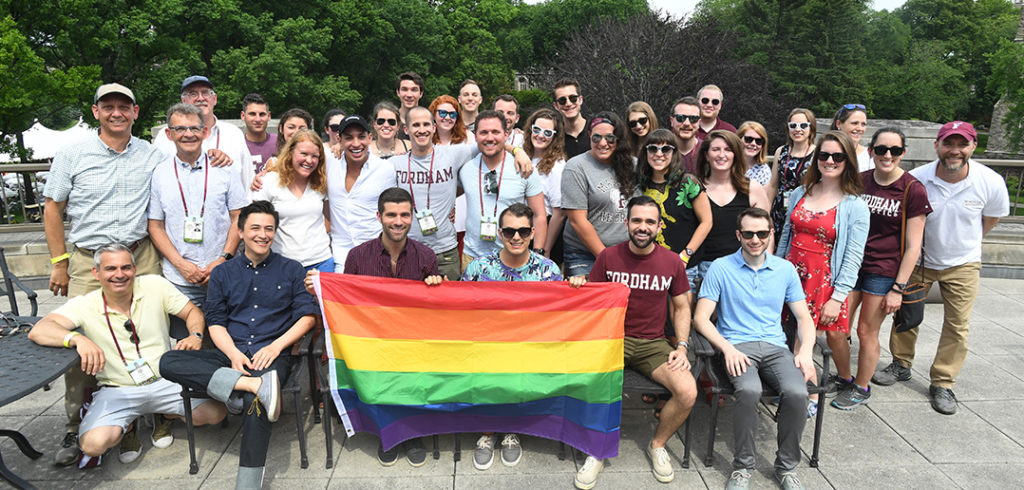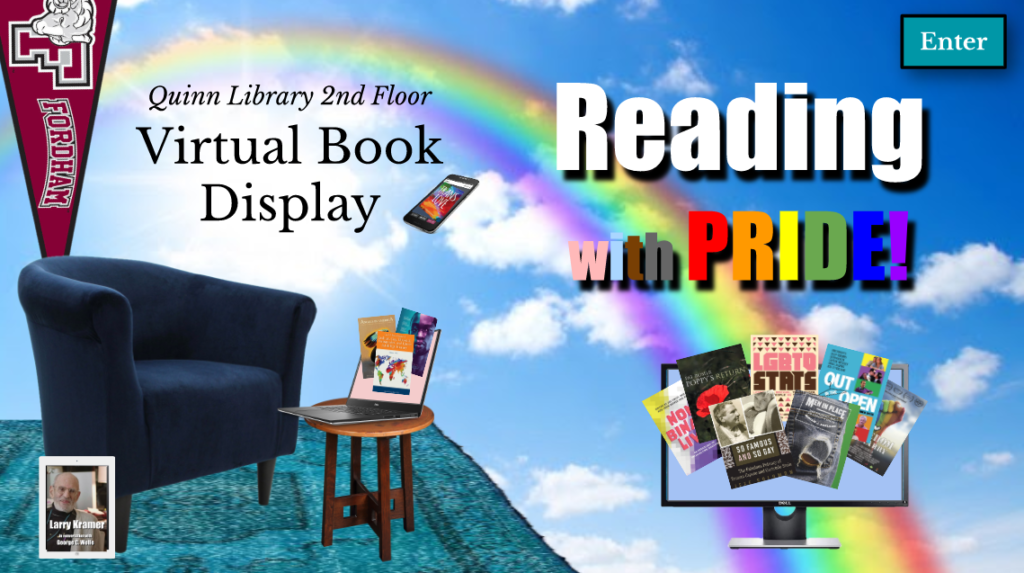Queering the Quarantine: Reflection & Resilience
By Robyn Ayers, Circulation Support Staff, Quinn Library
In the first post of this Queering the Quarantine series, we wandered around what Pride month might look like with the restrictions of social distancing, both within the Fordham community and beyond. In the second post, we explained what Fordham Libraries has to offer during Pride month, and also touched on tools to help you navigate this environment fraught with racial tension and social upheaval. Now, we are at the end of this series, and also the end of Pride month. COVID-19 is still rampant, the family of Breonna Taylor has yet to see justice, and we have no idea what our new normal will be. Processing that information can be extremely overwhelming, but you do not have to do it alone. This blog post is not a space for empty platitudes, or to pretend that all this change is easy or comfortable. Rather, the goal is to equip you with all the resources we can offer, so that you have access to the tools you need to best care for yourself.

This Pride month has been a far cry from the celebrations of 2019, when tens of thousands of people took to the street to joyfully commemorate the 50th anniversary of the Stonewall Riots. This year, the queer community is met with the all-encompassing loneliness of coping with COVID-19. In addition to the medical trauma and lack of in-person community, Black people are forced to confront heightened racial tensions at every turn. Unfortunately, Pride month (and all months) being heavily laden with themes of illness, death, and state-sanctioned violence is an all-too-familiar narrative. Even when there is not a major crisis, the microaggressions that wear away at the mental health of Black people and the social ostracization that robs queer people of community casts a constant shadow on life’s experiences. Queer and Black people are constantly confronted with the grief of both what has happened and what could have been, while simultaneously navigating a society determined to keep them out of the conversation.
Grief & University Services
Grief is a difficult thing to hold, especially when the situation is ongoing and constantly changing. Social isolation can make difficult feelings seem even more overwhelming, especially if you are removed from your support systems. Sometimes, technological connections aren’t enough to bridge that gap, and we need to seek out professional help. The Office of Counseling and Psychological Services (CPS) is currently operating virtually both by phone and over video conferencing. They have a wide variety of services available to students, staff, and faculty. Their team is made up of counselors, psychologists, and psychiatrists, and you can call in to request an initial screening or more information about any of their services. Beyond one-on-one support, CPS also offers drop-in groups and workshops. Their event page offers a full list and accompanying descriptions, one of which is the drop-in LGBTQ+ Support Space.

In addition to these more specialized groups, CPS also has comprehensive lists of Covid-19 distress management techniques, stress management resources, and a list of general resources for mental health and wellness. Campus Ministry published a blog post on Juneteenth that contained a prayer for racial justice and a few links to outside resources, including a comprehensive list of mental health resources for students of color courtesy of CPS. If these resource lists feel overwhelming, Campus Ministry offers grief counseling, which might be a gentler place for you to start. Our experiences with this pandemic and this social movement are extremely complex, and can vary widely depending on our relationship to societal structures in general. It can be very comforting to seek support from people who intrinsically understand where you are coming from.
Lack of routine, disconnect from support systems, and anticipatory grief are all extremely challenging things to deal with. Sometimes, taking action is one of the best ways to keep your head above water. If you feel like you need to do something, getting involved in your community and connecting with those who share similar beliefs and experiences can be an amazing reassurance. If you want to get involved in social justice on campus, the Center for Community Engaged Learning (CCEL) can point you in the right direction. CCEL facilitates community organization both within Fordham and the larger NYC community. However, remember to pace yourself while you’re at it – perhaps set aside an evening and take a peek at the Pride edition of the Virtual Book Display for some downtime activities. While none of these resources are a replacement for intimate emotional care, hopefully they can provide an outline on which you can build your own support network.

Although we cannot come together to navigate these uncertainties in the familiar ways that we hold dear, there are still ways that we can care for ourselves and for each other. It is so important to take care of yourself – to acknowledge the grief and leave room for the joy. Marginalized communities are forced to constantly mourn the losses: the loss of time, the loss of family, and the loss of life. Resilience can feel like an assignment that you never asked for, with no chance to opt out. Please know that you are not alone in these experiences. Grieve them as much as you need to, but cradle your heart with the knowledge that you do not have to navigate this by yourself. You are seen, you are acknowledged, and you are valued. Forgive yourself for the hard days. Cherish the hopeful moments. And if you need help – take a deep breath, harness all your courage, and reach out. Support systems may not look the same during this time of quarantine, but they are still there and waiting for you.


